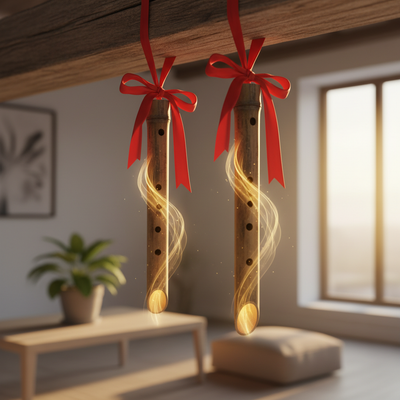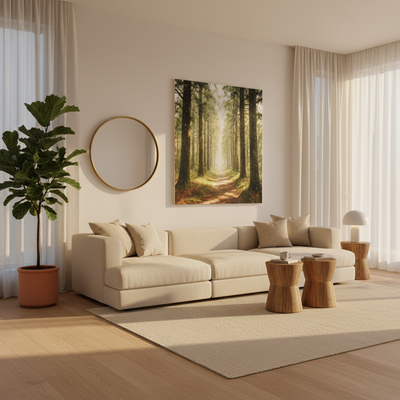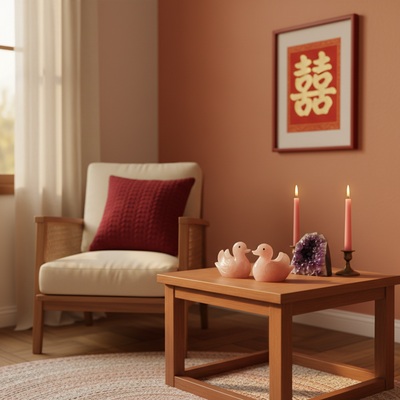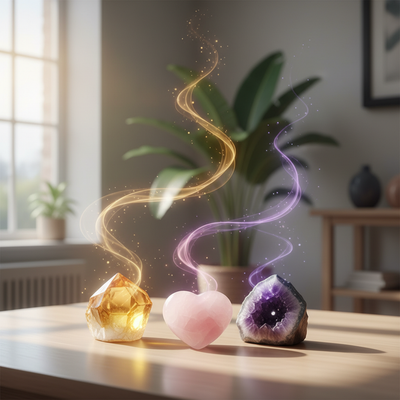Do you find yourself moving around restlessly at night, waking up feeling just as exhausted as when you went to sleep? Maybe you feel a quiet sense of distance in your relationship, or your thoughts simply won't quiet down in the one room that should be your peaceful retreat. These are everyday problems, and the answer might not be found in medicine or a new bed, but in how you arrange your space.
This is where Feng Shui helps. It's not a mysterious practice, but a useful, old system of organizing your space to support and improve your life's energy. It's about creating a space that helps you, not works against you. The goal of this guide is straightforward: to give you a clear, step-by-step plan to change your master bedroom. We will go beyond just making things look nice to create a space that helps you sleep better, strengthens relationships, and brings deep peace.
The 'Why': Basic Ideas

To really use the power of a feng shui master bedroom, we first need to understand the 'why' behind the practice. The main idea is Qi (pronounced 'chee'), which means life force energy. Think of Qi as a gentle stream that flows through your home. In a well-designed space, this stream is slow, healthy, and calm. In a messy or poorly arranged room, the energy becomes chaotic or, worse, stuck, leading to feelings of stress and tiredness.
The master bedroom has a special energy need. Its main purpose is rest, closeness, and renewal, which are all Yin qualities. Feng Shui works on the idea of balancing two opposite yet complementary forces: Yin and Yang.
-
Yin Energy (Perfect for Bedroom): This is the quiet, calm, and gentle energy. It includes soft lighting, curved lines, quiet spaces, darker and muted colors, and plush, soft textures. It encourages relaxation and sleep.
-
Yang Energy (To be Reduced): This is the active, bright, and strong energy. It is found in bright lights, loud sounds, hard surfaces, vibrant colors, and electronic devices. While important for other areas of your home like the kitchen or home office, too much Yang energy in the bedroom leads to restlessness and worry.
Our goal is to create a mainly Yin environment that allows your body and mind to fully relax, heal, and recharge for the day ahead.
The Command Position
If you make only one change to your bedroom, let it be this one. The single most important rule in Feng Shui for a bedroom is placing your bed in the "Command Position." This isn't about being controlling; it's about giving your mind a sense of security, safety, and control over your environment. When your nervous system feels secure, it can fully relax, making way for deep, healing sleep.
The Command Position means you can see the door to your bedroom from the bed without being directly in line with it. This placement prevents you from being surprised and allows you to see who or what is entering your space. It's a basic instinct for safety that we still have today.
How to Find Your Command Position:
- Stand in the doorway and look into your room. The best spot for your bed is usually on the wall diagonally across from the door.
- Place your bed against a solid wall. This provides a feeling of support and stability from behind. A solid, strong headboard makes this effect even better.
- Make sure that when you are lying in bed, you have a clear and unblocked view of the entrance. You shouldn't have to strain your neck to see it.
Positions to Avoid:
- The "Coffin Position": This is when your feet point directly out the door while you're in bed. This is considered the worst placement, as it's said that energy rushes at you too quickly and drains away from you as you sleep.
- Back to the Door: If you cannot see the door from your bed, it can create hidden feelings of vulnerability and worry, as you are not aware of what might be approaching.
- Directly Under a Window: A window does not provide the same solid support as a wall. It can lead to a feeling of unsupported energy and may disrupt sleep due to drafts, light, and noise from outside. If this is your only option, make sure you have a strong headboard and heavy, solid curtains.
Clear Out and Clean Up
Before you add a single new item or rearrange your furniture, the first and most important step is to perform an act of "energy cleaning": decluttering. In Feng Shui, clutter is more than just a physical mess; it represents stuck Qi. It creates a heavy, trapped energy that can show up as feeling overwhelmed, tired, and unable to move forward in life. The feeling of lightness and mental clarity that follows a thorough decluttering session is the immediate reward for this important work.
Your bedroom should be a sanctuary for rest and closeness only. Anything that does not serve these two purposes needs to be reconsidered and likely removed.
Your Bedroom Decluttering Checklist:
- Under the Bed: This space should ideally be completely clear to allow for the free flow of Qi around you as you sleep. If you absolutely must use it for storage, limit it to soft items only, such as spare linens, blankets, or pillows. Avoid storing anything with emotional baggage, like letters from an ex-partner, or sharp, metal items.
- Nightstands: These surfaces are well-known clutter spots. Pare them down to the absolute basics: a soft-glowing lamp, a current book, a glass of water, and perhaps a small, meaningful object. Avoid piles of old magazines, unpaid bills, or multiple electronic devices.
- Closet and Dressers: The "out of sight, out of mind" thinking is a myth in energy work. An overstuffed, disorganized closet creates a constant, low-level feeling of stress. Go through your wardrobe and let go of anything that is torn, doesn't fit, or no longer brings you joy. A well-organized closet represents a clear mind.
- The "No-Work Zone": This is non-negotiable. Your bedroom must be free of all work-related items. This includes your work desk, laptop, paperwork, and even exercise equipment. These items bring active, stressful Yang energy into your restful Yin space, constantly reminding your brain of to-do lists and physical effort. This creates a conflict of energy that makes true relaxation impossible.
Balancing the Five Elements
Once your space is clear, you can move to a more advanced level of Feng Shui: balancing the Five Elements. In this system, everything in the universe, including the items in your bedroom, is made up of five elemental energies: Wood, Fire, Earth, Metal, and Water. A harmonious room has a balanced representation of all five, creating a supportive and complete environment. You can use this framework to "diagnose" your room and add what is missing.
For a master bedroom, the Earth element should be prominent to foster a sense of stability and nourishment. Fire should be used as a small accent for passion, while Wood, Metal, and Water are used to create a balanced feel. Here is how to identify and incorporate each element.
| Element | Represents | Colors | Shapes | How to Add to Your Bedroom (Examples) |
|---|---|---|---|---|
| Wood | Growth, Vitality, Action | Green, Brown | Rectangular, Columnar | A healthy plant with rounded leaves, a solid wood headboard, cotton or linen textiles, art depicting trees or forests. |
| Fire | Passion, Energy, Romance | Red, Bright Orange, Pink | Triangular, Pointed | Use sparingly as an accent. A single red or pink throw pillow, candles (used safely and extinguished before sleep), warm-toned lighting from a dimmer switch. |
| Earth | Stability, Grounding, Nourishment | Sandy, Beige, Terracotta, Yellows | Square, Flat | This is a key element for bedrooms. A ceramic lamp base, earthenware decor, a plush wool rug, landscape art of fields or mountains, square-shaped nightstands. |
| Metal | Clarity, Precision, Efficiency | White, Grey, Metallics (Gold, Silver) | Round, Oval, Arched | A round metal-framed mirror (placed correctly), brass or silver drawer pulls, a crisp white duvet cover, a metal sculpture, an arched headboard. |
| Water | Flow, Wisdom, Serenity | Black, Deep Navy Blue | Wavy, Asymmetrical | Use with care to avoid overwhelming the space. A piece of art depicting calm water (no storms), a mirror (which represents water), a black picture frame, an object with an undulating shape. |

Look around your room. Is it all white and grey (too much Metal)? Does it feel cold and sterile? Add Earth tones with a beige rug and Wood with a plant. Is it filled with dark wood furniture (too much Wood)? Lighten it with Metal elements like a white duvet and a round mirror.
Mirrors, Artwork, and Plants
Certain decor items carry a strong energy weight in Feng Shui and require careful placement. Mirrors, artwork, and plants can either significantly enhance your bedroom's Qi or create major disruptions.
Mirrors
Mirrors are powerful activators in Feng Shui. They double and bounce energy around a room. While this can be helpful in other spaces, it can be too active for a restful bedroom.
- DO: Place a mirror where it reflects something beautiful, such as a view of nature out a window or a lovely piece of art. This doubles the positive energy. A mirror that reflects light from a lamp can also help brighten a dark corner.
- DON'T: Place a mirror so that it directly faces your bed. This is the most common Feng Shui mistake with mirrors. It is believed to disrupt sleep by bouncing too much energy around and can energetically invite a "third party" into the couple's relationship, potentially leading to infidelity. Also, avoid using collections of small, broken, or distorted mirror tiles, as they "cut up" your reflection and the room's energy.
Artwork
The art you hang in your bedroom has a deep hidden influence on your mood and thoughts. You are absorbing its message for eight hours every night.
- DO: Choose artwork that brings up feelings you want to develop: calmness, happiness, and romance. Images that feature pairs are excellent for a master bedroom—two birds, two flowers, a couple walking hand-in-hand. Abstract art with soft, flowing colors can also be very calming.
- DON'T: Hang artwork showing solitary figures, sad or melancholic scenes, conflict, or aggressive imagery. These can secretly promote feelings of loneliness and worry. Avoid hanging a very large, heavy piece of art directly over the head of the bed, as this can create a hidden sense of danger.
Plants
Plants bring Wood element energy—the energy of life, growth, and vitality—into a space. While this is positive, too much can be overly stimulating for a bedroom.
- DO: Choose one or two healthy plants with soft, rounded leaves, which promote a gentle and nurturing energy. Place them away from the immediate vicinity of the bed, such as on a dresser or in a corner across the room.
- DON'T: Overfill the room with plants. A bedroom is not a jungle. Too much Wood energy can stifle rest and create an atmosphere of activity rather than repose. Avoid plants with sharp, spiky leaves like cacti or snake plants in the bedroom, as their pointed shapes create "sha qi," or sharp, attacking energy.
A Real-World Transformation
Theory is one thing, but seeing the principles in action makes the benefits real. We often encounter clients struggling with their personal sanctuary, and the transformations can be profound.
The Problem
A couple, Sarah and Tom, contacted us feeling disconnected and constantly exhausted. They reported sleeping poorly and arguing more often. A look at their master bedroom immediately revealed several energy challenges. Their bed was pushed against a wall with a large window behind it. A massive sliding closet door with a full-length mirror directly faced the bed. The room was also home to a stationary bike piled with clothes and stacks of work-related books on the nightstands. The energy felt chaotic, heavy, and anxious.
The Solution
This is a classic challenge that our team at THE QI FLOW often helps clients resolve. We guided them through a simple, 3-step process to reclaim their sanctuary:
- Reposition and Support: The first, most critical move was to get the bed into the command position. We moved it to the solid wall diagonally opposite the door. They invested in a beautiful, upholstered headboard to create a strong sense of support and stability, which was missing with the window placement.
- Declutter and Remove: The exercise bike, a symbol of stressful Yang energy, was moved to a spare room. The workbooks were relocated to the home office. To solve the mirror problem without a costly renovation, they applied a beautiful, decorative removable film over the glass. This obscured the reflection while adding a soft, elegant pattern to the room.
- Balance and Enhance: The room was dominated by cool grey walls and white furniture (Metal element). To ground the energy, we added strong Earth element touches: a plush, sandy-beige rug under the bed and a pair of matching ceramic lamps on the nightstands. To enhance romance, they chose a piece of art depicting two intertwined figures, hung on a wall they could see from their bed.
The Result
Within a few weeks, the feedback was remarkable. Sarah reported sleeping through the night for the first time in months. Tom mentioned the room felt "incredibly calm" and that they were enjoying quiet, connected conversations in the evening instead of feeling stressed. By addressing the flow of Qi, they transformed not just their room, but the quality of their rest and their relationship.
Common Bedroom Mistakes
As you apply these principles, it can be helpful to have a quick checklist of the most common and harmful Feng Shui mistakes to avoid in the master bedroom.
- Beams or Slanted Ceilings Over the Bed: A heavy beam or a sharply angled ceiling directly over where you sleep creates a cutting, oppressive energy that can lead to headaches and a feeling of being weighed down.
- Electronics in the Bedroom: TVs, computers, and even phones emit disruptive electromagnetic fields (EMFs) and active Yang energy. Critically, studies show that the blue light emitted from screens significantly disrupts the production of melatonin, the hormone that regulates sleep.
- Water Features or Images of Water: While a fountain is lovely in a living room, water energy is too active and flowing for a restful space. It can be associated with financial loss or emotional instability when placed in the bedroom. This includes aquariums and even large paintings of oceans or rivers.
- A Headboard-less Bed: A bed without a headboard, especially if it's floating in the middle of a room, lacks a sense of support and stability. This can translate to instability in your life and relationships.
- Too Many Books: While one or two books on your nightstand are fine, a bedroom filled with bookshelves can create an overly intellectual and active energy. It keeps your mind "at work" when it should be resting.
- Doors That Don't Open Fully: A bedroom door (or closet door) that is blocked by furniture or clutter and cannot open at least 90 degrees symbolizes blocked opportunities and restricts the flow of nourishing Qi into your personal space.
Your Journey to a Sanctuary
You now have the basic knowledge to transform your feng shui master bedroom into a true sanctuary. Remember the most important takeaways: place your bed in the command position for security, clear all clutter to allow energy to flow freely, and thoughtfully balance the Five Elements to create a harmonious environment.
Feng Shui is not a rigid set of rules to be followed with worry, but a personal journey and a practice of intention. Start small. Choose one or two changes that resonate most with you—perhaps simply clearing your nightstands and moving your bed. Pay attention to how the room feels and how you feel within it. Enjoy the process of consciously creating a bedroom that doesn't just look good, but actively supports, nurtures, and rejuvenates you every single night.







